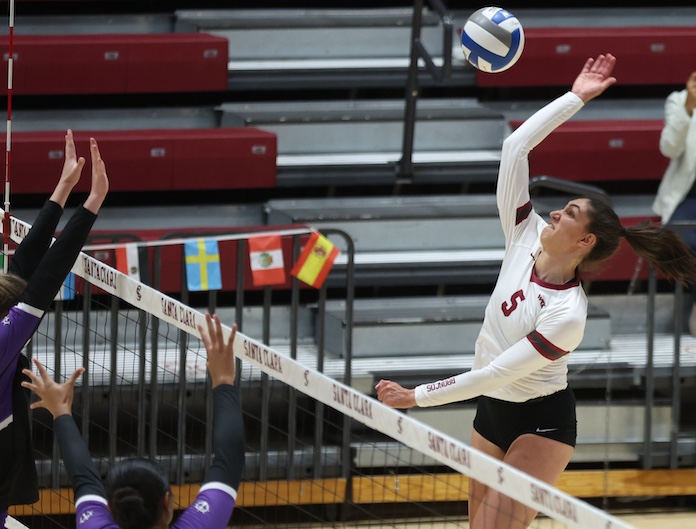
Israelis on NCAA volleyball teams play on while dealing with a harsh reality
Santa Clara junior outside hitter Oren Abutbul/Santa Clara Athletics
In the early morning hours of October 7, sirens wailed in Jerusalem, warning citizens to take cover as missiles launched by Hamas troops headed toward Israel. At about the same time, Hamas soldiers stormed blockaded areas along the Gaza Strip and began shooting Jewish settlers and taking dozens of hostages.
At 6:30 a.m. October 7 in Israel, when the warnings sounded, it was 11:30 p.m. October 6 on the campus of Northeastern University in Boston. Graduate-student setter Inbal Peleg was sound asleep in anticipation of the next day’s home volleyball match against Delaware.
She was shaken from her slumber by the sound of her phone. As she checked the messages, she got word of anticipated missile strikes on her home country.
But, as she noted, missile warnings are not uncommon in Israel. So Peleg went back to sleep. It wasn’t until the next morning that she realized the scope of what was happening.
Three time zones to the west, Santa Clara junior outside hitter Oren Abutbul was wide awake. She was working to meet a deadline on a project for one of her classes and sought the help of her brother, who was home in Zichron Yaakov, Israel.
The response to her text, she thought, was a bit odd. Her brother said to give him a couple of minutes because there were alarms going off.
Northeastern’s Inbal Peleg/Northeastern photo
Like Peleg, whose hometown of Haifa is about 20 miles north of Zichron Yaakov, Abutbul didn’t give it much thought. It happens. So she figured she would give him an hour and then try to reconnect.
She was just glad her brother was awake so early. More time to help with her project.
In the meantime, she called her friend and fellow Israel native Mika Rome, a freshman setter at LSU. Rome told Abutbul there also were alarms going off in her home of Ra’anana about 60 miles south of Zichron Yaakov and 90 miles north of the northernmost point of the Gaza Strip.
Finally, it was time to text her brother again. The response was similar.
Abutbul said he told her things “are getting a little crazy here” and they would talk later.
So she decided to put her project on the back burner and go to bed. She, too, had a match the next day, a West Coast Conference contest against Saint Mary’s.
When she awoke Saturday morning, Abutbul saw a flood of messages on her phone and called her father immediately. That’s when she found out about the Hamas attacks.
“I’m, like, really confused because this has never happened before,” Abutbul said. “And I didn’t really understand what was going on. But my Instagram was just full of that and then I read the news, and I was just kind of shocked.”
Throughout that morning the gravity of the situation began to sink in. Abutbul said she went through fits of crying on and off throughout most of that day. She played in the match, a straight-set loss by Santa Clara, and managed to record 12 kills.
Peleg did not participate in Northeastern’s match with Delaware that day as she rested an injury. But for her, Abutbul and the rest of their compatriots — there are a total of seven Israeli players competing for NCAA Division I programs — volleyball offers a welcome, albeit temporary, distraction.
“It has been because I’ve been playing volleyball for so long — 12 years now — and it’s just kind of a no-thinker,” Peleg said.
Abutbul said she can block out the tragedy of the events in her homeland while she is on the volleyball court. As soon as volleyball is over, she said, the thoughts come rushing back.
She often uses those down times to call family and friends back home to get the latest updates and check on their well-being. Navigating the 10-hour time difference between California and Israel can be tricky, but she usually finds a window. Going to class. Walking to practice. Whenever.
Peleg and Abutbul are fortunate, in a way. Military service is mandatory for all Israeli citizens. Both ladies served their required two years before coming to the U.S. to attend college.
And their hometowns are far enough away from the fighting that they are not directly affected. But they are affected in other ways.
One of the first places attacked by Hamas, Abutbul said, was a party that she called “kind of like an international rave.” There were some 3,000 people — mostly in Abutbul’s age bracket — at this party, and, she said, 300 of them were killed and many more were kidnapped.
One of her brothers helped to organize the party. He, along with a cousin, had been there just the day before.
Abutbul said she knows at least one of the kidnap victims from the party, and several of her brother’s friends — those at the party and those in the military — have been killed.
“A lot of his friends died as well,” she said. “Whether they were at the party or they went out to fight, he knows a lot of people who died.”
Additionally, one of her brothers remains a military reservist in Israel.
Peleg, too, knows some of the victims of the invasion.
“I went to high school with a couple of the girls who were murdered,” she said.
Teammates have been quick to come alongside and lend their support. Peleg spent her first four seasons playing at American, and, she said, many of her former teammates, coaches and even some school administrators contacted her to check on her.
“My (current) roommates (grad students Julianna Truscott from Canada and American Anabel Zier) were the ones who were most affected by the way I responded,” Peleg said, “so I think they realized right away what was going on and were right there for me. They’re great friends, obviously.”
Abutbul, too, said many of her teammates were quick to support her, offering their thoughts verbally and in social media posts. But, she said, most of them don’t truly understand what is happening and, moreover, why it is happening.
If she is asked, Abutbul said she is more than happy to explain the background. But there’s a caveat.
“The main thing I’m trying to convey is, if you’re really interested, don’t just take my word,” she said. “Actually go and explore on it. I want you to hear (this) from other people and other sources as well.”
Of course, the Israeli players have each other, too. Aside from Abutbul, Peleg and Rome, there are Tali Hakas (Hawai’i), Maya Dudockin (Loyola Maryland), Chen Abramovich (Middle Tennessee) and Lana Kutakhina (San Francisco) playing for Division I programs.
“The Israeli volleyball community is very small,” Peleg said. “We all know each other and went to high school together pretty much and played national team together. We grew up together.”
Added Abutbul: “Make sure we have that, ‘Are you OK?’ … And then if it’s stuff deeper than that, if we’re better friends, we’ll call and we’ll talk about stuff that’s going on in each of our campuses and how each of us is dealing with it and just share tips how to handle it.”
When she finishes her degree at Northeastern, Peleg said she will go back to Washington, D.C., where American U. is located, to pursue her career. She wants to work for Israel’s embassy as a diplomat.
Perhaps that is appropriate, given the volatility she has seen in such close proximity for much of her life. She has no taste for politics, she said, but with diplomacy, many doors can be opened, and cooperation can be achieved.
In the meantime, she communicates daily with her parents. Their advice to her usually is the same: Keep living your life. We’ll be fine. Israel will prevail.
Abutbul has heard that, too. That Israel will win. To her, that’s a mixed message.
“I don’t know what’s the definition of ‘win’ because … in my perspective, we lost 1,400 people and we have 200 kidnapped,” she said, “so I don’t know what’s the meaning of ‘win.’
“Right now, the ideal situation would be to bring back all the kidnapped people home, all the hostages, make sure they’re healthy and alive with as little damage to Israel as we can do.”
Peleg shares that sentiment. These, she said, are unprecedented times in Israel. There still is shock and angst over the outbreak of violence. The bottom line, she said, is securing the freedom of the hostages.
“And I think on both sides, there are people that are suffering because of terrorism,” Peleg added, “and both sides need to understand that civilians are not the ones who should be targeted.”
The post Israelis on NCAA volleyball teams play on while dealing with a harsh reality appeared first on Volleyballmag.com.
Read More Volleyballmag.com News


